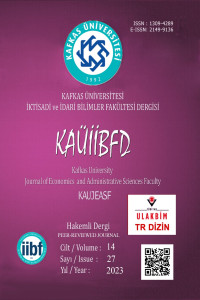BÖLGESEL BİR GÜVENLİK ANLAYIŞI OLARAK NATO’NUN BAŞARISINI ETKİLEYEN POLİTİK FAKTÖRLERİN AMPİRİK ANALİZİ
Abstract
Kurulduğu andan bugüne kadar profesyonel ajandasını geliştiren NATO Soğuk Savaş’tan bugüne ayakta kalan ve etkinliğini koruyan örgütlerin başında gelmektedir. Bu çalışmanın ortaya çıkışı, ABD gibi merkez ülkelerin politik istikrarlarının NATO’nun sürekliliğindeki yerinin sorgulanması ile ilgilidir. Çalışmanın yöntemi NATO içerisindeki devletlerin Fragile State Index ve The Worldwide Governance Indicators kapsamındaki politik faktörlerine dayandırılarak panel veri analizi ile değerlendirilmesi şeklinde kurgulanmıştır ve disiplinler arası bir bakış açısıyla, analitik bir bağlam oluşturulmuştur. NATO’nun sürekliliğine katkı sağlayan ülkelerin politik etkinlikleri incelendiğinde başta ABD olmak üzere birçok ülkenin diğer üyelere göre geride olduğu, kuzey ülkelerinin görece daha etkin olduğu sonucuna ulaşılmıştır.
Keywords
References
- Açıkmeşe, S. A. & Dizdaroğlu, C. (2014). NATO-AB ilişkilerinde işbirliği ve çatışma dinamikleri. Uluslararası İlişkiler, 10 (40), 131-163.Aisen, A. & Veiga, F. J. (2005). Does political instability lead to higher inflation? a panel data analysis. IMF Working Papers, No 5/49. Aktürk, Ş. (2012). NATO neden genişledi? uluslararası ilişkiler kuramları ışığında NATO’nun genişlemesi ve ABD-Rusya iç siyaseti. Uluslararası İlişkiler, 9 (34), 73-97.
Abstract
NATO, which has been developing its professional agenda since its establishment, is one of the organizations that have survived and preserved its effectiveness since the Cold War. The emergence of this study is about questioning the place of political stability of central countries such as the USA in the continuity of NATO. The method of the study is based on evaluating the NATO states within the scope of the Fragile State Index and The Worldwide Governance Indicators with panel data analysis. From an interdisciplinary perspective, an analytical context has been created. When the political activities of the countries that contribute to the continuity of NATO are examined, it is concluded that many countries, especially the USA, are behind compared to other members and that the northern countries are relatively more effective.
Keywords
References
- Açıkmeşe, S. A. & Dizdaroğlu, C. (2014). NATO-AB ilişkilerinde işbirliği ve çatışma dinamikleri. Uluslararası İlişkiler, 10 (40), 131-163.Aisen, A. & Veiga, F. J. (2005). Does political instability lead to higher inflation? a panel data analysis. IMF Working Papers, No 5/49. Aktürk, Ş. (2012). NATO neden genişledi? uluslararası ilişkiler kuramları ışığında NATO’nun genişlemesi ve ABD-Rusya iç siyaseti. Uluslararası İlişkiler, 9 (34), 73-97.
Details
| Primary Language | Turkish |
|---|---|
| Subjects | International Security |
| Journal Section | Articles |
| Authors | |
| Publication Date | June 26, 2023 |
| Acceptance Date | February 24, 2023 |
| Published in Issue | Year 2023 Volume: 14 Issue: 27 |
KAUJEASF is the corporate journal of Kafkas University, Faculty of Economics and Administrative Sciences Journal Publishing.
KAUJEASF has been included in Web of Science since 2022 and started to be indexed in the Emerging Sources Citation Index (ESCI ), a Clarivate product.
2025 June and December quota for the Business Administration has been completed. Submissions in the scope of Business Administration will not be evaluated until further notice. Manuscript acceptance and evaluation of other fields within the scope of our journal continues.


